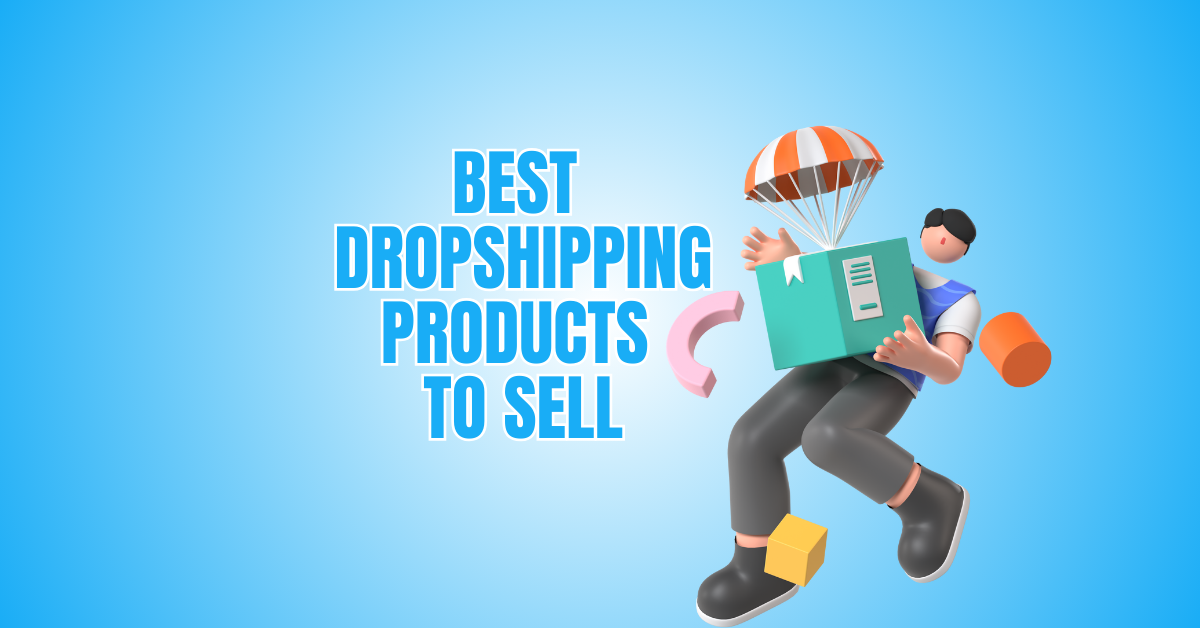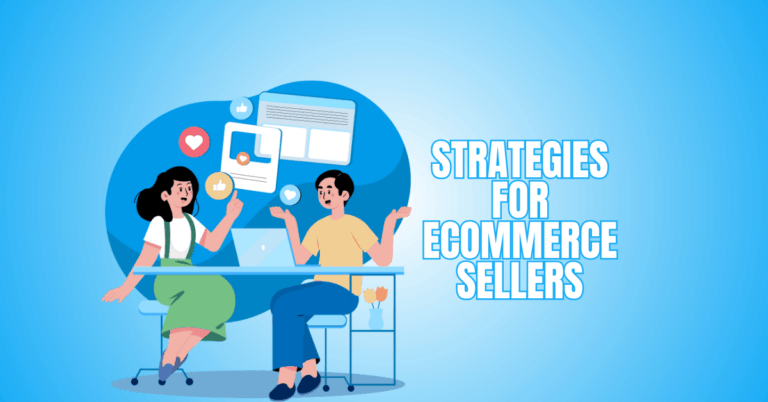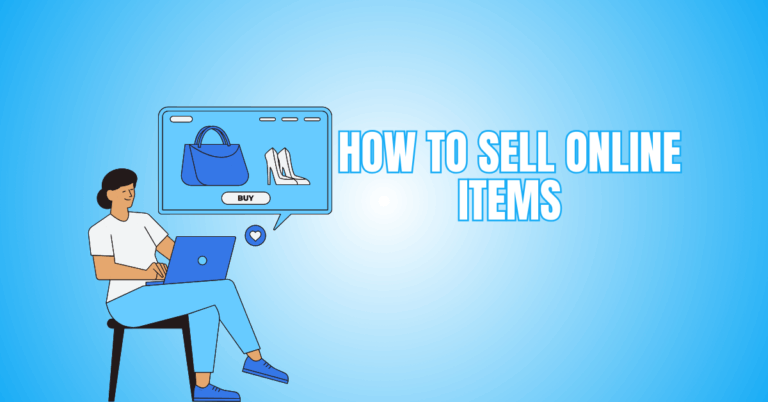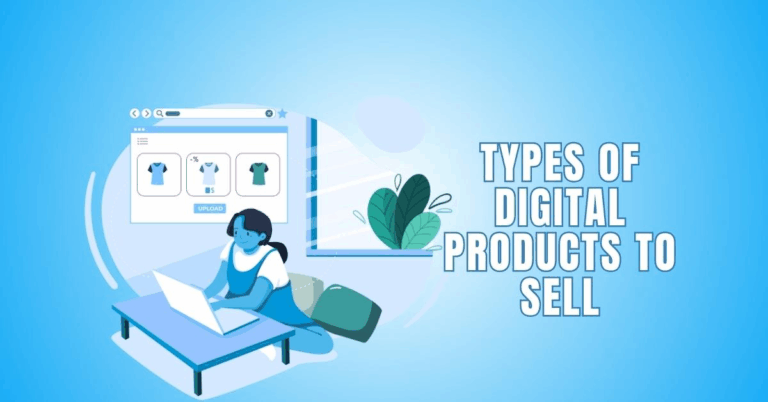Best Dropshipping Products To Sell
Selecting the top dropshipping items to offer can mean the difference between an online store that succeeds and one that fails. The right products provide high demand, healthy profit margins, and low return rates.
Whether you're a beginner or scaling your store, choosing trending, evergreen, or niche items ensures consistent revenue. This guide lists 24 winning dropshipping products that are hot in 2025, complete with earning potential and setup tips.
Use this curated list to align with customer needs, discover untapped opportunities, and build a successful, low-overhead ecommerce brand that runs on autopilot.
Best Dropshipping Products To Sell
1. Resistance Bands
Resistance bands are a staple in the home fitness niche. Lightweight and compact, they are perfect for dropshipping. These bands appeal to workout beginners, rehab patients, and travellers. Sourced cheaply ($3–$7), you can price them at $20–$30.
Bundle them with video tutorials or fitness eBooks for added value. Promote them on Instagram and TikTok with fitness influencers or via home workout content. Highlight portability, versatility, and joint-friendly resistance.
You can run Facebook ads targeting people interested in fitness, yoga, or physical therapy. The profit margin per set ranges from $10 to $20, making them ideal for both one-off and bundle sales.
2. Posture Correctors
Posture correctors help relieve back and neck strain caused by poor ergonomics. These are highly marketable to remote workers, students, and gamers.
Sourced at $5–$10, they retail for $25–$40, yielding $15–$30 profit per unit. Set up an educational campaign using before-and-after visuals and video testimonials.
Focus on Facebook and Instagram ads using pain-point marketing like “Tired of Slouching All Day?” Offer bundled deals with ergonomic chairs or standing desk accessories.
Use blog content to target SEO traffic around back pain and desk jobs. This is a product that solves a real problem, ensuring demand year-round.
3. LED Strip Lights
LED strip lights have exploded in popularity thanks to TikTok and YouTube room decor trends. Perfect for bedrooms, gaming setups, or dorm rooms, these lights are easy to install and visually impressive.
Priced at $20–$35 with a cost of $5–$10, they offer a $15–$25 profit margin. Target teens, students, and content creators.
Showcase use cases with vibrant videos and room transformation images. Create value packs by bundling remote-controlled or sound-reactive lights.
Offer seasonal sales (e.g., back-to-school or holidays). With aesthetic appeal and impulse-buy potential, these are ideal for short-form video ads and influencer promotion.
4. Pet Hair Remover Roller
This reusable roller is a must-have for pet owners who deal with fur on clothes and furniture. Unlike tape-based rollers, it’s eco-friendly and washable. Dropshipping cost is around $2–$5, and sells for $15–$25.
Market the product through pet-related Facebook groups, Instagram reels with pets, or email newsletters to pet lovers. A video showing quick fur removal works wonders for conversion.
You can upsell grooming gloves, lint brushes, or de-shedding tools. This product is also great for a bundle sale or a gift on higher orders. Expect to make $10–$20 in pure profit per sale.
5. Portable Blender
Portable USB blenders are a hit among health enthusiasts, travellers, and students. They allow users to blend smoothies or protein shakes on the go. Most models cost around $10–$15 and can be sold between $30–$50.
That’s a solid $15–$35 profit per unit. Create content targeting fitness lovers or busy moms—show them using it at work, the gym, or outdoors. Instagram Reels and Pinterest are great for lifestyle content.
Offer bundle deals with smoothie recipe eBooks or reusable straws. Position it as a modern, healthy-living must-have and focus on its convenience, portability, and rechargeable design.
6. Silicone Kitchen Utensil Set
A silicone kitchen utensil set is a stylish, heat-resistant alternative to traditional cooking tools. These are especially popular among minimalist and modern kitchen owners.
Sets cost $7–$12 and can be sold for $25–$45, giving you $15–$30 in profit. Use Pinterest for kitchen decor boards and Instagram for aesthetic posts.
Bundle with matching containers or cutting boards. These sets also make great gifts, so highlight that in your product description.
Use SEO-rich blog posts targeting “kitchen organization” and “gifts for home cooks.” Offer discounts on bundles to encourage multi-item purchases during the holidays.

7. Blue Light Blocking Glasses
Blue light-blocking glasses are essential in today’s screen-heavy world. They lessen headaches, eye strain, and disturbed sleep by filtering harmful blue light from digital devices.
With rising screen time due to remote work and online learning, demand is surging. These glasses cost $3–$6 and retail for $20–$35, offering $12–$25 profit per unit.
Market through educational content about digital eye health, and partner with productivity bloggers or remote work influencers. Offer value bundles, like two-packs for couples or families.
Showcase trendy frames to appeal to fashion-conscious users, and upsell screen cleaners, laptop stands, or desk organizers for increased cart value.
8. Baby Feeding Sets
Silicone baby feeding sets—complete with bowls, cups, and spoons—are a hit with eco-conscious parents. They're BPA-free, soft, durable, and simple to clean, making them perfect for babies transitioning to solids.
Priced at $5–$8 wholesale, they can sell for $25–$35, earning a $15–$25 profit margin. Use soft pastel visuals and emotional taglines like “Make Mealtime Stress-Free” to attract buyers.
Market through parenting forums, Facebook groups, and mommy blogs. Bundle with bibs or teething toys for a higher perceived value.
Gift-ready packaging appeals to baby shower buyers, making this evergreen niche highly profitable and emotionally driven for dropshipping success.
9. Car Phone Mounts
Car phone mounts are essential for safe, hands-free driving, especially for commuters and rideshare drivers. These mounts come in various designs—magnetic, suction, or air vent styles—costing $2–$4 and selling for $15–$25.
That’s a $10–$20 profit margin per unit. Promote with relatable content showing drivers using GPS, answering calls, or playing music safely. Use TikTok car hack videos or YouTube driving accessory reviews for visibility.
Bundle with car chargers or cable organizers for added value. Urgency-based copy like “Stay Safe While Driving—Limited Stock!” boosts conversions. These year-round sellers also make great additions to road trip or car care kits.
10. Mini Projectors
Mini projectors transform any room or outdoor space into a home theatre, making them a hit with students, families, and movie lovers. Priced at $25–$40, they typically sell for $60–$100, yielding profits of $25–$60.
Market their plug-and-play convenience, portability, and smartphone compatibility. Create lifestyle content showcasing backyard movie nights, cozy dorm setups, or family gaming sessions.
Promote on Pinterest, Instagram, and YouTube for visual impact. Bundle with projector screens, tripods, or HDMI adapters for upsells.
Their popularity spikes during the holidays, making them ideal for Black Friday, Cyber Monday, and Christmas promotions. A potent evergreen and seasonal product combo.
11. Neck Massagers
Electric neck massagers offer tension relief for remote workers, seniors, and fitness fans. These wearable devices often come with vibration, heat, and kneading features.
You can source them for $15–$25 and sell them at $40–$70, bringing in $20–$45 per sale. Create videos showing usage while working at a desk or relaxing after exercise.
Market through wellness influencers and Facebook ads targeting users interested in stress relief. Position it as a perfect self-care or gifting product.
Bundle it with essential oils or a massage ball for upsells. User testimonials and before-and-after comparisons can significantly improve conversion rates.
12. Reusable Makeup Remover Pads
Eco-friendly beauty is booming, and reusable pads replace single-use cotton rounds. Usually made from soft bamboo fiber, they are cost-effective at $2–$5 and can sell for $15–$25.
Profit per sale: $10–$20. Market to environmentally conscious audiences with sustainability messaging like “Reduce waste in your skincare routine.”
Use Instagram beauty influencers or green lifestyle bloggers. Sell in packs with wash bags and include a sustainability guide as a digital freebie.
These products also perform well as subscription box add-ons or gift bundles. Their low cost and high value make them ideal for first-time buyer promotions.

13. Phone Tripods With Bluetooth Remote
Phone tripods with Bluetooth remotes are ideal for vloggers, content creators, and remote professionals. These tripods offer adjustable heights, stable phone grips, and hands-free control, making them perfect for filming, live streams, or video calls.
They cost around $5–$8 and sell for $20–$35, offering $12–$25 profit—market on TikTok or YouTube with influencers in fitness, beauty, or travel. Use hashtags like #CreatorSetup or #DeskTour. Bundle with ring lights or clip-on mics as a “Starter Creator Kit.”
Highlight compatibility with different phones and share setup tutorials. They’re popular gift items during holidays and great for seasonal bundle offers.
14. Jewelry Organizers
Jewelry organizers combine function and style, helping users declutter while elegantly displaying accessories. Options like velvet trays, travel cases, or hanging racks appeal to different needs.
Costing $4–$7, they sell for $20–$35, earning $12–$25 in profit. Showcase on Instagram reels and Pinterest boards with vanity setups or “organization inspo.”
Create SEO-friendly content targeting “best jewelry organizer for travel” or “small space jewelry storage.” Bundle with costume jewelry or compact mirrors for gift sets. Target fashion-forward women aged 18–45.
These organizers sell exceptionally well during gift-giving seasons like Mother’s Day, graduations, and weddings, offering great potential for themed promotions.
15. Laptop Stands
Laptop stands improve posture and airflow, appealing to remote workers and students. Aluminum or foldable plastic designs cost $7–$10 and sell for $25–$40, offering $15–$30 profit.
Highlight ergonomic benefits in your product description and show how the product integrates into minimal workspaces.
Run Facebook and YouTube ads featuring desk makeovers and productivity tips. Partner with influencers in tech and study niches. Offer bundles with keyboard protectors, wrist rests, or mousepads.
These products sell especially well during back-to-school or work-from-home promotions and can become part of a larger “office starter kit.”
Wealthy Affiliate – Mini Review (2025)
If you’ve ever thought about turning your blog, passion, or niche into an online business,
Wealthy Affiliate (WA) is one of the most beginner-friendly platforms I’ve used.
It combines step-by-step training, website hosting, SEO research tools,
and an active community all in one place.
What I like most: you can start free (no credit card needed),
explore lessons, test the tools, and connect with other entrepreneurs
before upgrading. WA isn’t a “get rich quick” scheme — it’s a platform where success comes
from consistent effort and applying what you learn.
16. Jewelry Cleaning Pens
Jewelry cleaning pens offer fast and convenient cleaning for engagement rings and necklaces. Lightweight and portable, they’re perfect for upselling alongside accessories.
Costs range from $2–$4, while retail prices sit between $15–$25. That’s a potential profit of $10–$20 per unit. Demonstrate the cleaning power through Instagram reels and before-and-after photos.
Use bridal blogs or wedding influencers to promote the pen as a “ring day essential.” Pair it with jewelry cases or ring dishes for a themed bundle. It’s also an ideal item for subscription boxes or gifting bundles due to its novelty and effectiveness.
17. Kids’ Educational Toys
STEM toys, flashcards, and magnetic blocks are popular among parents who want their children to learn through play. Source age-appropriate, safe, and colourful items for $7–$12 and sell for $25–$45. Profit margin: $15–$30.
Use emotional selling with phrases like “Build your child’s brain one block at a time.” Target parenting Facebook groups and run Pinterest ads featuring activity ideas.
Create bundles by age (e.g., “Toys for 3–5 Years Old”) to increase cart value. These products have strong evergreen demand and peak in sales during birthdays, back-to-school, and holiday seasons.
18. Kitchen Sink Organizers
Organizers that hold dish soap, sponges, and cloths help declutter sink areas. Sourced at $3–$5 and sold for $15–$25, they offer a $10–$20 profit. Promote them using short cleaning hack videos on TikTok or Pinterest.
Position as space-saving, rust-proof, and easy to clean. Run home decor-themed email campaigns or feature them in spring cleaning promotions. Bundle with dish brushes or silicone drain stoppers.
Highlight user-generated content showing organized kitchens for added trust and visual appeal—an excellent product for targeting renters, small apartment dwellers, or minimalist households.
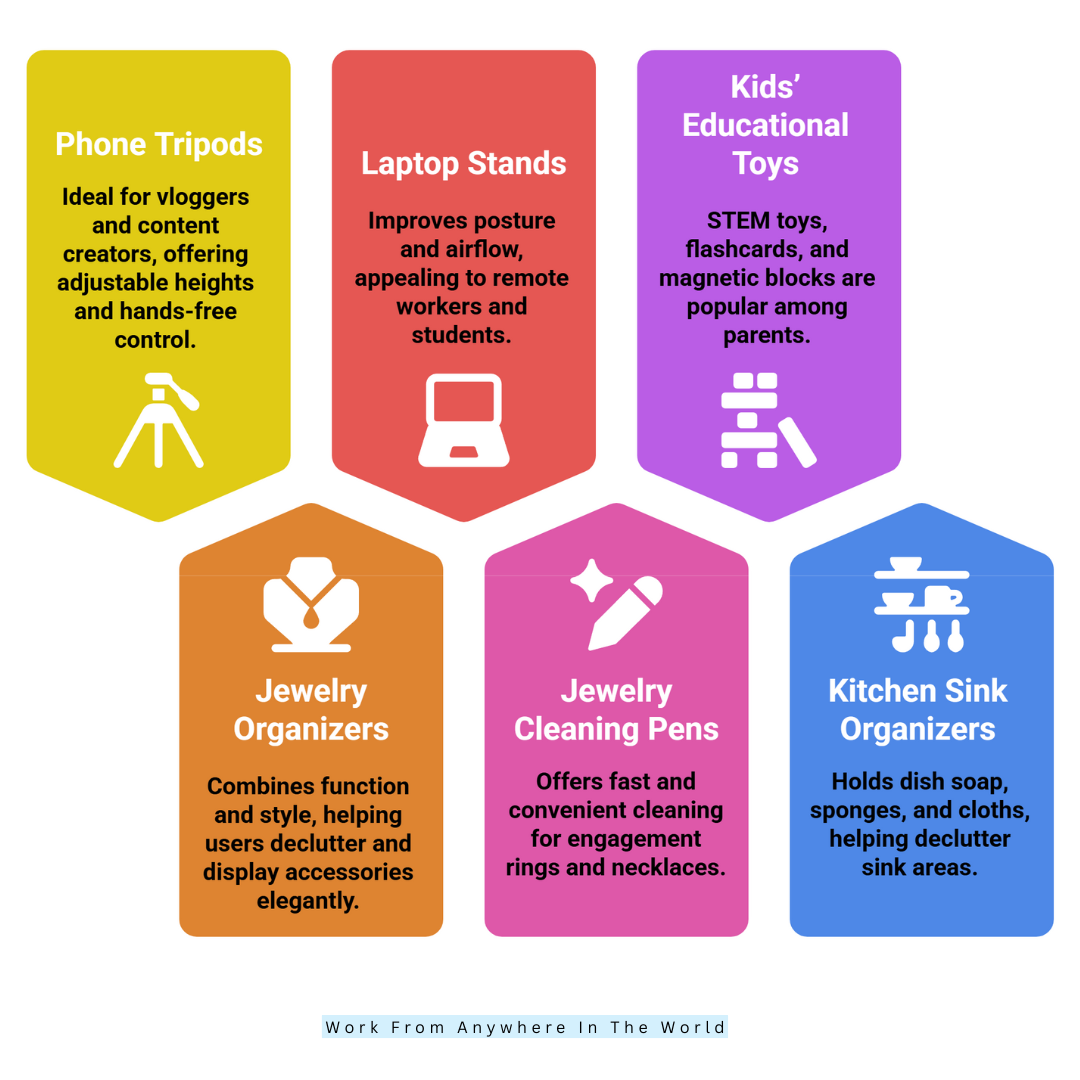
19. Desk Cable Organizers
These clip-on or adhesive accessories keep cords neat and tangle-free. Ideal for tech enthusiasts, students, and work-from-home professionals. Cost: $1–$3, selling price: $10–$20, with a profit of $8–$15.
Market with desk setup reels and productivity tips on social media. Pair with items like mouse pads or USB hubs. Offer as a low-cost impulse item or a gift with orders over $50.
You can also bundle it into a “Desk Clean-Up Kit.” Target tech workers, gamers, or minimalists via keyword-rich blog posts and influencer reviews.
20. Shoe Cleaning Kits
Sneaker care kits often include a cleaning solution, a soft brush, and microfiber cloths. Ideal for sneakerheads and fashion-forward shoppers.
Source kits for $5–$8 and sell for $25–$40, earning $15–$30 per sale. Promote on Instagram or YouTube using sneaker influencers. Show real shoe transformations and offer branded packaging.
Use scarcity tactics like “Only 500 left this month!” Bundle with sneaker storage bags, crease protectors, or waterproof sprays.
Consider upselling with email follow-ups for premium care kits. Position is a must-have for preserving new shoes or reviving old favourites.
21. Camping Hammocks
Outdoor gear continues to trend, and lightweight camping hammocks are popular among travellers, hikers, and festival-goers.
Made of parachute nylon, they pack down small and offer excellent margins. Source for $8–$12 and retail at $30–$50. Profit: $20–$35. Create lifestyle content showcasing hammocks set up in nature.
Use Instagram reels, TikTok camping challenges, or gear review blogs. Target campers, digital nomads, and van-life followers.
Bundle with bug nets or carabiners. Seasonal peaks include spring and summer, especially around holidays like Memorial Day and July 4th in the US.
22. Nail Art Kits
These DIY kits offer polish, stencils, rhinestones, and UV lamps for home manicures. Target young adults, beauty fans, and budget-conscious shoppers. Kits cost $10–$15 and sell for $30–$50, leaving $20–$35 in profit.
Market with TikTok tutorials and Instagram before-and-after videos. Offer holiday-themed kits or seasonal nail design templates. Great for gifting, self-care bundles, or subscription boxes.
Use email campaigns targeting beauty shoppers or promote through beauty bloggers. Create limited edition designs or launch new colour combos to build urgency and repeat sales.
23. Travel Packing Cubes
Packing cubes simplify luggage organization and are popular with travellers, families, and digital nomads. A 6-piece set typically costs $5–$8 and retails for $20–$35. Profit: $12–$25 per sale.
Promote with packing hacks, travel blog content, or Reels showing how to fit more in less space. Great for bundling with toiletry bags or neck pillows.
Market with vacation or business travel themes. Run promotions during spring break, summer, and holiday seasons. Ideal for upsells on travel-focused stores or through email lists tied to lifestyle and travel brands.
24. Teeth Whitening Kits
These at-home kits are highly profitable, offering a cosmetic solution without a trip to the dentist. Source kits with LED light trays and whitening gel for $10–$20 and sell them for $30–$60. Potential earnings: $20–$40 per unit.
Market with influencer content, before-and-after photos, and testimonials. Target beauty-conscious shoppers via Instagram and TikTok. Position as a “smile upgrade” or pre-event beauty essential.
Bundle with oral care items like floss picks or breath strips. You can even offer a subscription model for monthly gel refills to increase long-term revenue.

Conclusion
A successful e-commerce business is built on selecting the greatest dropshipping products to sell. The 24 items in this guide offer a potent mix of high demand, low shipping risk, and attractive profit margins.
Whether you're targeting fitness buffs, pet lovers, tech users, or beauty enthusiasts, each product is backed by market trends and consumer interest.
Start with a niche that aligns with your passion, focus on great marketing, and always work with reliable suppliers. With the right product strategy and consistent effort, your dropshipping store can generate sustainable income and grow into a thriving online brand.
I trust you enjoyed this article on the Best Dropshipping Products To Sell. Please stay tuned for more insightful blogs on affiliate marketing, online business, and working from anywhere in the world.
Take care!
— JeannetteZ
💬 Your Opinion Is Important To Me
Do you have thoughts, ideas, or questions? I’d love to hear from you. Please leave your comments below or email me directly at Jeannette@WorkFromAnywhereInTheWorld.com.
📚 More Work From Anywhere Reads
🚀 Ready to Build a Business You Can Run from Home
or from Anywhere in the World?
Imagine creating income on your terms — from home, a cozy café, or wherever life takes you.
With the right tools, training, and community support, it’s entirely possible.
Start your own online business for free — no credit card needed.
Disclosure
This post may contain affiliate links. As an Amazon Associate and participant in other affiliate programs, I earn from qualifying purchases at no extra cost to you. Please read my full affiliate disclosure.

